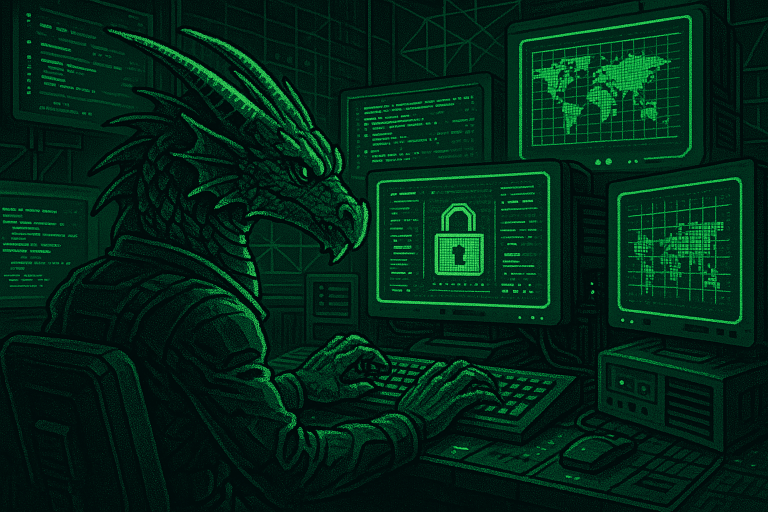DragonForce Hackers 🚨, Drone Factory Gets Erased 🛡️, And China's New Phone Hack! 📱
Also - the little-known history of old-school AOL hackers.
Your passwords are like the keys to your creative empire.
Would you leave them under the welcome mat?
Strong, unique, and changed often - that's your new ritual.
Guard access with the same intensity you guard your deepest secrets.
No shortcut is worth the breach.
#Security #Privacy #Secret
Welcome to the July 18, 2025, issue of Pithy Security. Here are this week's three most significant cybersecurity developments.
DragonForce Hackers Hit Belk Retail Chain, Snag 156GB Of Data.
A cybercrime group known as DragonForce has claimed responsibility for a significant data breach at Belk, a prominent department store chain based in North Carolina. The hackers claim to have stolen nearly 156 gigabytes of company data, adding Belk to a growing list of high-profile retail victims this year, which also includes Harrods and Victoria's Secret.
Key Insights:
DragonForce operates a "Ransomware-as-a-Service" (RaaS) scheme, allowing various groups to utilize its leak site to post stolen data. This makes it difficult for companies to trace the origin of an attack or identify patterns early. Since rebranding as a cartel, DragonForce has boasted over 130 victims on its site since March.
Why This Matters For You:
The shift from lone hackers to organized criminal enterprises mirrors the evolution of traditional organized crime. As cybercriminal cartels achieve operational sophistication rivaling Fortune 500 companies, the assumption that your data will eventually be compromised becomes a planning necessity. Not a paranoid precaution.
Read More on Cybersecurity Dive.
Inside The Cyberattack That Disabled A Russian Drone Factory.
A Ukrainian hacking group (called BO Team or Black Owl) claims to have destroyed the entire IT network of Gaskar, a leading Russian drone maker. The cyberattack reportedly wiped out 47 terabytes of critical data, including drone blueprints and 10 terabytes of backup files. The group states that it worked alongside Ukraine's Ministry of Defence, highlighting how digital tactics are now integral to modern conflict.
Key Insights:
Gaskar's systems were so deeply compromised that employees reportedly had to trigger the fire alarm to open doors. If the hackers' claim holds up, thousands of military drones may never reach Russian forces. It is another sign that cyber sabotage is reshaping the battlefield. And they didn't need tanks.
Why This Matters For You:
We're witnessing the maturation of cyber warfare from espionage tool to strategic weapon. When hackers can eliminate (at least temporarily) thousands of military assets without firing a shot, the traditional boundaries between digital and physical security have collapsed. Everyone running critical infrastructure should assume they're already in someone's crosshairs.
Read More on The Register.
China's New Phone Hacking Tool - What Travelers Need To Know.
Security researchers have discovered a new tool used by Chinese authorities to hack seized phones. The software, called Massistant and developed by Xiamen Meiya Pico, lets officials extract texts, photos, locations, and private messages, even from secure chat apps like Signal.
Key Insights:
Massistant works without needing any fancy exploits, zero-days, or sophisticated techniques. The operators only need physical access to your unlocked device. Forums in China are filled with reports from individuals who have noticed the malware after interacting with law enforcement. Because Chinese law allows warrantless phone searches, anyone, resident or visitor, could be affected.
Why This Matters For You:
Massistant represents the industrialization of phone surveillance. We're moving from isolated incidents to systematic government capability. If governments weaponize routine interactions with law enforcement, the notion of "private" communication will become geographically contingent. This means privacy-savvy travelers should now adopt operational security mindsets previously reserved for intelligence operatives.
Read More on TechCrunch.
✍️ Learn Cybersecurity - The History Of AOL Hacker Culture
In the 1990s and early 2000s, AOL was the epicenter of cyber subculture. Early phreakers and hackers pioneered social engineering, phishing, spamming, password cracking, and DIY malware, exploiting the platform's lax authentication. Handles like "Da Chronic" and "MaGuS" became synonymous with early digital mischief and the rise of the proto-hacker.
Early AOL hackers developed user-friendly (but malicious) tools, or "proggies", such as AOHell and Fate X, among many dozens of others, that automated punting, false TOS accusations, email bombs, and phishing attacks, thereby democratizing cybercrime for thousands of users. In response, AOL instituted primitive countermeasures, but the cat-and-mouse escalation shaped early incident response, usability trade-offs, and the art of deception.
The AOL era cemented foundational cybersecurity truths. Modern phishing kits, backdoor Trojans, piracy networks (also known as warez groups), spam networks, botnets, and social engineering tactics all trace their origins back to that formative period.
🔧 My Favorite Cybersecurity Tools
These are my go-to privacy + security tools. Some links are affiliate links. (They support this newsletter at no extra cost to you!)
Proton Mail - One of the more private and secure email services. Basic accounts are free.
Proton VPN – Keep your internet, browsing history, and connection secure, with servers in 120+ countries.
Proton Pass - Protect passwords with an elite encrypted password manager. Supports 2FA codes, device sync, multiple vaults, notes, and more.
Proton Drive - Store your data safely. Get 5GB for free and enjoy peace of mind while keeping your files safe.
About Pithy Security | Privacy News Made Easy
Cybersecurity threats, data privacy risks, AI-powered attacks, and quantum hacking are evolving faster than anyone predicted.
To stay secure, you must stay up to date, upskill, adapt, and leverage new defenses. That's the benefit of Pithy Security. It provides you with weekly cybersecurity news and real-world strategy in a concise, no-fluff format.
Want even more cybersecurity gems, tips, and experiments? I post extra insights regularly at the links below.
PS: Do you have questions, comments, or feedback? The best way to contact me is by replying to this email!
Thanks for reading. Look out for more cutting-edge AI insights in your inbox soon.
Newsletter Disclaimers
You're receiving this because you subscribed at PithySecurity.Substack.com. You can unsubscribe at any time using the link below. This newsletter reflects my personal opinions, not professional or legal advice. I may earn commissions from recommended tools. Thanks for your support!




